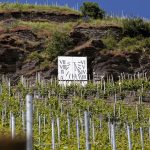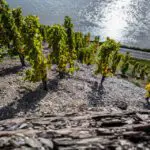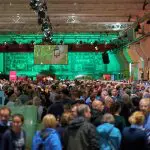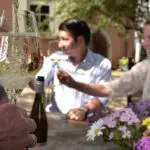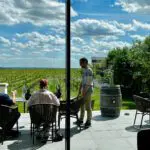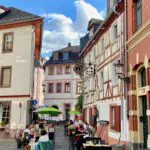
You’ll be visiting Germany soon. The itinerary is set. You are ready for historic sites, good food, and great German wines. Oh, yes, wines and wineries are higher on your list than the tour of Neuschwanstein, Burg Eltz, and the Eagle’s Nest combined! You’ll soon be conquering the land of Riesling and Pinot Noir!
[…] Pinot Noir… — pardon, did you say ‘Pinot Noir’? In Germany it is called Spätburgunder, silly! But it’s the same variety as in Burgundy, and if you ask the locals it’s as good as, and possibly even better than, the French variety just not yet as famous. So, yes, the same grape, but a different name! You’ll have to ask for Spätburgunder [spat-boor-goon-der].
Now, that is the cue for a couple of terms to be familiar with when wine-travelling in Germany. Read and study!
Wines and Varieties
Wine is Wein in German. Same pronunciation, easy enough.
Now to the most important varieties:
Riesling is Riesling [reesleeng]
Pinot Noir is Spätburgunder[spat-boor-goon-der]
Pinot Gris is Grauer Burgunder [grower boor-goon-der]
Pinot Blanc is Weisser Burgunder [waisar boor-goon-der].
Don’t bother learning other varietal names. As you tour the wineries there will be many grapes with no international names for you to test your tongue-twisting skills. Though, if you must, start with Silvaner, Dornfelder, and Müller Thurgau….
Once you’re in Germany you’ll need to get to the wineries:
A winery or estate is called a Weingut [wine-good]. Once you’ve arrived at the winery, look for the tasting room. A traditional winery will feature a Probierstube [pro-beer stoo-baw] or its modern take which is called a Vinothek [vin-o-tech]. You might even be lucky enough to see the Keller [keller] — which is the cellar, or even luckier, the winemaker called Winzer [win-tzar] himself will show you the property.
Ask for a tasting
‘Wein probieren’ [wine pro-beer-an]: that’s the open-sesame for your tasting experience, or, in simple English: wine-tasting. There’s normally no prefab wineflight to taste. You’ll get to taste what you ask for. In order to help you, the winemaker will let you have a list of his entire wine programme which is about three times as large as the average US winery would feature and usually three times more confusing as well. You’ll resort to simplicity. You have red wine, Rotwein [rote-wine, not rott-vine!]), white wine, Weisswein [waiss-wine], or one of the varieties you learned above. Then, in most cases, you can choose between different levels of sweetness: from dry, trocken [trok-ken], to off-dry, feinherb [fain-herb], to sweet, süss [zeus]. You may need to pick a vintage too. This is called the jahrgang [yawr-gawng].
Now how to comment your wine like a Pro!
It’s time to impress your host with some kick-a** German wine-tasting slang:
– Your wine was tasty and pleasant to drink. Say: Lecker [Laek-ker]. There is little translation for this as lecker can be applied to any food or drink that you enjoy. It means somewhere between good and very good.
– Now that wine was awesome! Say: Ganz grosses Kino! [Gawns-grossaws-keeno], literally referring to seeing a great movie.
– Polite expression for not liking a wine. Say: Nicht mein Ding [Nesht-main-deeng] – not my thing, not my cuppa tea.
After sampling the wine, ask if the estate has a Strausswirtschaft [sh’trauss-weert-shaft] – good luck pronouncing that – or a Besenwirtschaft [bey-sen-weert-shaft]. These are proper, simple winemakers’ restaurants that are open only during certain seasons. They are well worth looking for as you’ll get simple German fare and great wines served in copious amounts at ridiculously low prices. They are usually favourite places for locals to eat as well.
With that you are well equipped to go on your wine adventure in Germany. Go get them! May the Force will be with you!

